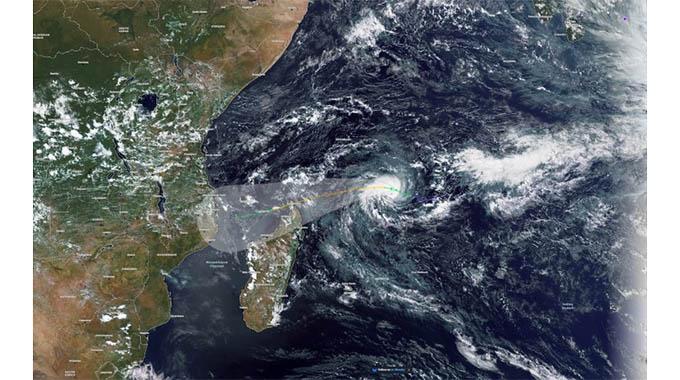News / National
Cyclone Chido wreaks havoc, Zimbabwe braces for Impact
17 Dec 2024 at 04:38hrs |
0 Views

Cyclone Chido, one of the strongest storms to hit Southern Africa in recent years, has caused widespread devastation in Mauritius, Madagascar, Mayotte, and Mozambique. The powerful cyclone, which made landfall earlier in the week with wind speeds reaching up to 250km/h (155 mph), is now expected to affect Zimbabwe significantly.
The Zimbabwe Meteorological Department has issued warnings of heavy rainfall, flooding, and potential landslides as Cyclone Chido moves across the region. Although the cyclone is predicted to dissipate near Zimbabwe by the end of today, authorities remain on high alert, urging citizens to take necessary precautions. Emergency services are on standby to respond swiftly to any disaster situations.
Zimbabwe's neighbors, Mozambique and Malawi, have already experienced the brunt of Cyclone Chido, with reports of extensive damage and loss of life. Thousands of people have been displaced, and communities in low-lying areas have been particularly hard hit by heavy rains and strong winds.
Cyclone Chido first made landfall on December 11 in Agaléga, Mauritius, where it caused catastrophic damage. The island was reportedly "devastated," with an 8-metre storm surge and violent winds destroying homes, schools, and infrastructure, leaving widespread power outages. In Madagascar, the cyclone brought milder but still impactful damage, with minor flooding, power outages, and structural damage reported, particularly in Antsiranana. Mayotte faced more severe consequences, as winds reached up to 226 km/h and over 15,000 homes were left without electricity.
Mozambique bore the brunt of Cyclone Chido's fury as it made its way inland. Heavy rains and intense winds battered the coastline, displacing thousands and destroying critical infrastructure. Malawi, situated along the cyclone's path, also experienced torrential rains and severe disruptions, adding to the regional crisis.
With Zimbabwe next in line, the government has called for vigilance among citizens. Communities in flood-prone and mountainous areas have been urged to stay alert for possible flash floods and landslides. "We are monitoring the cyclone's movement closely, and all emergency services are on standby,†said a spokesperson from the Meteorological Department. "Residents should stay informed and avoid unnecessary travel during this period.â€
The Zimbabwean government's proactive approach aims to minimize the cyclone's potential impact, especially in vulnerable rural and urban areas where infrastructure may struggle to withstand heavy rainfall. As Cyclone Chido continues to lose strength, the region remains on high alert, recovering from the widespread devastation. Governments across Southern Africa are working to coordinate disaster relief efforts and provide aid to affected communities.
Cyclone Chido's destruction underscores the growing frequency and intensity of extreme weather events in the region, prompting calls for improved disaster preparedness and resilience measures.
This is a developing story. Updates will follow as more information becomes available.
The Zimbabwe Meteorological Department has issued warnings of heavy rainfall, flooding, and potential landslides as Cyclone Chido moves across the region. Although the cyclone is predicted to dissipate near Zimbabwe by the end of today, authorities remain on high alert, urging citizens to take necessary precautions. Emergency services are on standby to respond swiftly to any disaster situations.
Zimbabwe's neighbors, Mozambique and Malawi, have already experienced the brunt of Cyclone Chido, with reports of extensive damage and loss of life. Thousands of people have been displaced, and communities in low-lying areas have been particularly hard hit by heavy rains and strong winds.
Cyclone Chido first made landfall on December 11 in Agaléga, Mauritius, where it caused catastrophic damage. The island was reportedly "devastated," with an 8-metre storm surge and violent winds destroying homes, schools, and infrastructure, leaving widespread power outages. In Madagascar, the cyclone brought milder but still impactful damage, with minor flooding, power outages, and structural damage reported, particularly in Antsiranana. Mayotte faced more severe consequences, as winds reached up to 226 km/h and over 15,000 homes were left without electricity.
Mozambique bore the brunt of Cyclone Chido's fury as it made its way inland. Heavy rains and intense winds battered the coastline, displacing thousands and destroying critical infrastructure. Malawi, situated along the cyclone's path, also experienced torrential rains and severe disruptions, adding to the regional crisis.
With Zimbabwe next in line, the government has called for vigilance among citizens. Communities in flood-prone and mountainous areas have been urged to stay alert for possible flash floods and landslides. "We are monitoring the cyclone's movement closely, and all emergency services are on standby,†said a spokesperson from the Meteorological Department. "Residents should stay informed and avoid unnecessary travel during this period.â€
The Zimbabwean government's proactive approach aims to minimize the cyclone's potential impact, especially in vulnerable rural and urban areas where infrastructure may struggle to withstand heavy rainfall. As Cyclone Chido continues to lose strength, the region remains on high alert, recovering from the widespread devastation. Governments across Southern Africa are working to coordinate disaster relief efforts and provide aid to affected communities.
Cyclone Chido's destruction underscores the growing frequency and intensity of extreme weather events in the region, prompting calls for improved disaster preparedness and resilience measures.
This is a developing story. Updates will follow as more information becomes available.
Source - online
Join the discussion
Loading comments…































